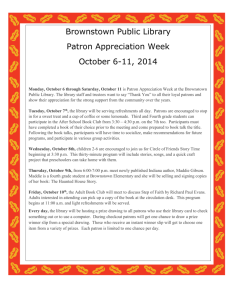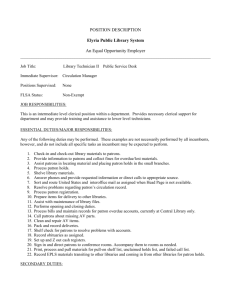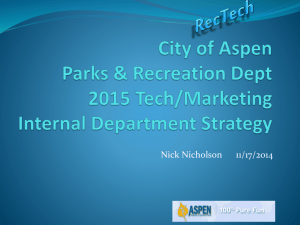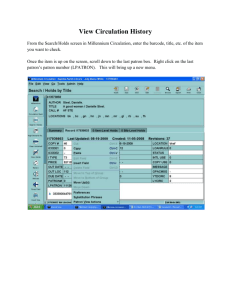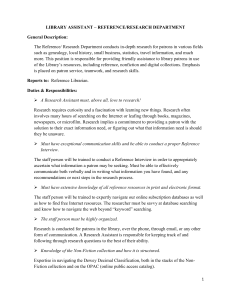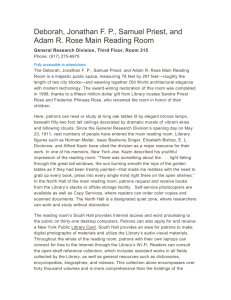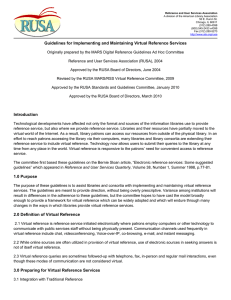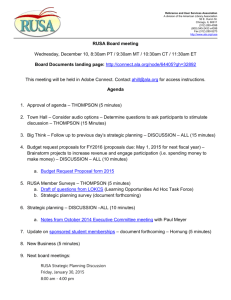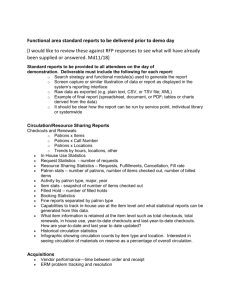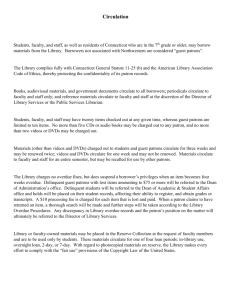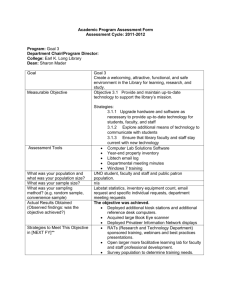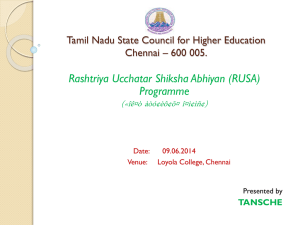Digital Reference
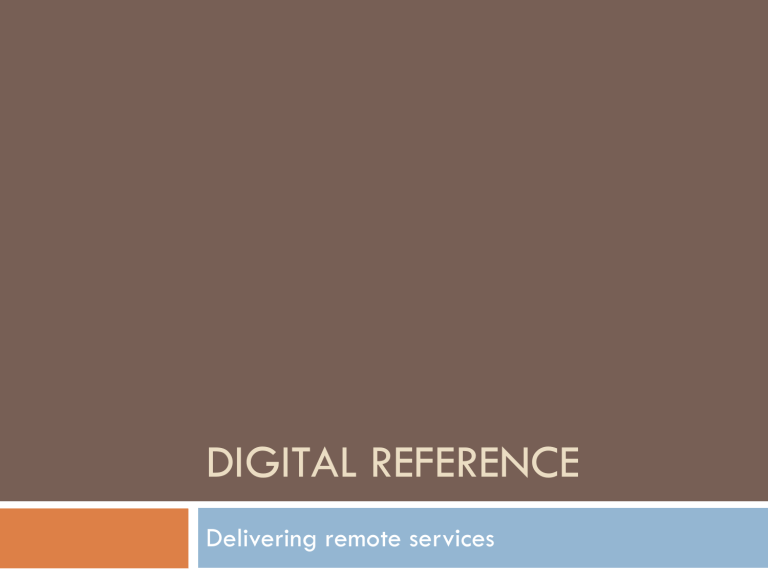
DIGITAL REFERENCE
Delivering remote services
Definition (RUSA)
Virtual reference is reference service initiated electronically, often in real-time, where patrons employ computers or other Internet technology to communicate with reference staff, without being physically present. Communication channels used frequently in virtual reference include chat, videoconferencing, Voice over IP, co-browsing, email, and instant messaging.
Definition (RUSA)
While online sources are often utilized in provision of virtual reference, use of electronic sources in seeking answers is not of itself virtual reference.
Virtual reference queries are sometimes followedup with telephone, fax, in-person and regular mail interactions, even though these modes of communication are not considered virtual.
Digital Reference…
Same old reference, different format/method of delivery.
Digital Reference
Expands service to remote users
Those with physical disabilities and mobility issues
Hearing impaired
Rural patrons
May overcome other barriers to approaching physical/traditional reference desk
Digital Reference
Planning for service
Patrons/ Clientele
Clearly define the clientele
Address issues of patron authentication, if required.
Any exclusions should be uniformly enforced
Market to targeted groups
Parameters of Service
Should be extension of traditional reference
Same quality goals
Clearly define levels of service, including:
Types of questions service will (or will not) answer.
How to respond to queries outside of the parameters of service.
Is document delivery included? Is it free?
Patron population served.
Infrastructure
Equipment, facilities, and technology must be updated, plan for evolution
Considerations must be made for patron infrastructure/equipment access, including patrons with disabilities.
Spectrum of Service Models
asynchronous email Instant message synchronous
Commercial chat
Page-pushing
Co-browsing
Voice over IP
Web conferencing
Instant Message
Advantages
Patron familiarity
Low/ no cost
Little/ no special technology
Disadvantages
Management intensive
Queuing
Stats
Typing (no scripting, no page-pushing or cobrowsing= more typing)
Many different applications- Meebo solves some of this
Commercial Chat
Advantages
Page-pushing/ Cobrowsing
Application sharing
Scripting
Transcripts
Stats
Question routing
Disadvantages
More tech intensive
Plug-ins
More platform dependence
Server space/ tech support
Expensive
Lower patron familiarity
Some Tools
Embedded IM
Libraryh3lp
Multiple logins
Saves transcripts
Facilitates transfers
Meebo, etc.
Crosses platforms
Allows for embedding
Implementation
Staffing, Training, & Customer Service
Staffing Models
On-site or Off-site
Hours of operation
Regular, predictable schedule
Single or Double duty
Prioritizing if double duty
Scheduling if single duty
Collaborative/ Consortium Staffing
More common in public libraries
Issues of geo-local questions
Training
General technology- software/products
Resources
Customer service and quality expectations
Challenges and Obstacles
In Digital Reference
Challenges
Time to answer
Lack of nonverbal cues
Online behaviors
Incorporating instruction
Behavioral Issues in Virtual Reference
Librarians
Effective reference interview
Adherence to RUSA guidelines
Bias or discrimination during interactions
Response times
Length of answers
Forms of address and closure
Users
Inappropriate questions/ remarks
Threats
Impatience
Inappropriate requestshomework, copyrighted or subscription protected materials.
Librarian Guidelines
Set levels of expectation for behavioral interactions and quality
Importance of greetings and closings
Maintaining “word contact” throughout interaction to avoid
“dropped” patrons
Web communication conventions
Acronyms (BTW, IMHO)
Emoticons ;0)
Time parameters
Order of answering calls
Turnaround time on emails
“Callbacks” or email follow-up for in-depth questions
Behavior in Virtual Reference
User guidelines (i.e. Texas State)
Be patient. Network traffic may affect response time. A reference librarian will respond to your question as soon as possible. If your question is urgent, you may send your response by email.
Communicate in short sentences.
Reference questions will be answered in the order they are received.
Inappropriate behavior will not be tolerated. Common courtesies are expected and appreciated.
A survey will be available at the end of each chat session for users for feedback and comments about the service.
http://www.library.txstate.edu/about/departments/ref/policies/vrpolicy.ht
ml
Instruction
A substantial amount of instruction takes place
Incorporate guidance on finding and evaluating information, not just providing answers
Advantage is single contact, point-of-need assistance
Can reduce time by incorporating video, images, and web annotation rather than just text
Privacy and Confidentiality
Include privacy disclaimers
Develop retention schedules for transcripts & make publicly available
Patrons should be alerted if transcripts are saved
Remove identifying information
If questions are used for databases & FAQs, make sure no privacy/confidentiality is violated
Alert patrons that question content may be sued in this way.
Allow for patron feedback
Connectivity
Access, Outreach, & the Digital Divide
Pew Research Report (2008)
Overall connectivity (at home)
55% of American adults have broadband
17% growth in adoption over 1 year
10% have dial-up access
27% are not internet users (mostly over 60)
Breakdown
25% of low income (>$20,000/yr)
43% of African Americans
Flat growth rate for both above groups
38% of rural Americans (compared to 57% urban)
Pew Research Report (2008)
Levels of service
54% have basic broadband
29% have premium
One in ten non-broadband users say services aren’t available where they live
http://www.pewinternet.org/~/media/Files/Reports/2
008/PIP_Broadband_2008.pdf
References
Breitbach, William and DeMars, J. Michael(2009)
'Enhancing Virtual Reference: Techniques and Technologies to Engage Users and Enrich Interaction', Internet Reference
Services Quarterly, 14: 3, 82 — 91
•
Gronemyer, Kate; Deitering, Anne-Marie. ‘I Don’t Think It’s
Harder, Just Different.’ Reference Services Review, 2009,
Vol. 37 Issue 4, p421-434,
Pew Research Report. (2008) Broadband. http://www.pewinternet.org/~/media/Files/Reports/20
08/PIP_Broadband_2008.pdf
References
•
Texas State Virtual Reference Policies http://www.library.txstate.edu/about/departments/ref/policies/vrpolicy.h
tml
IFLA Digital Reference Guidelines http://archive.ifla.org/VII/s36/pubs/drg03.htm
RUSA Guidelines http://www.ala.org/ala/mgrps/divs/rusa/resource s/guidelines/virtrefguidelines.cfm
